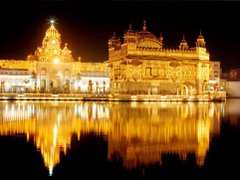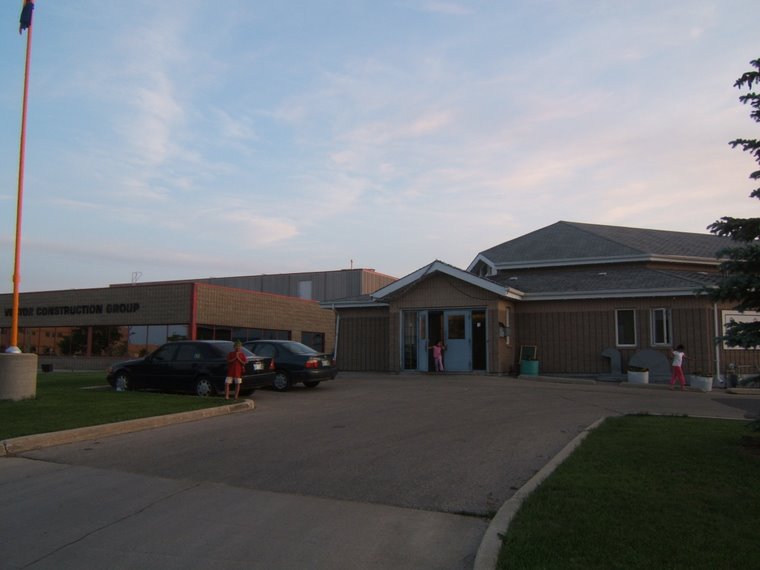Every time a non-Sikh wishes to learn more about Sikhs, invariably the words seva, equality of women fumble out as a hallmark of Sikhi. For many years I have introduced Sikhs to my friends, colleagues and strangers on planes, trains and roads as those devoted to service of humanity. Every time I would do so, the ape in me would thump his chest and feel pride in giving equality to women and helping those who are less fortunate. The ape took a harsh beating recently. Allowing women to do various types of seva including kirtan at the Harimandir Sahib has been in the news for some time now. Some digging took me to this article by Kirn Kaur written almost 15 years back. The ape realized one thing for sure that without humility true seva is not possible, which made me wonder at the nature of seva some of these men do at the Harimandir. The article is reproduced as such and the link below is to the picture she made.
By Guru Kirn Kaur Khalsa
We were expectant and excited as we started down to the Siri
Harimandir Sahib at 12:10 AM on March 10th, 1996. This was the night
for which I had prayed for years. Tonight we would be graced with the
blessing of doing seva in our Guru's House in the Amrit Vela. Bibiji
Inderjit Kaur, wife of Siri Singh Sahib Harbhajan Singh Khalsa
Yogiji, myself and several other ladies had traveled from America on
Singh Sahib Manjit Singh's invitation to participate in the long
awaited opportunity to participate in this holy seva. Together, we
walked around the parkarma and made our way in silence to the
Darshani Deori. We sat down with the other Gursikhs who had gathered
there for seva. Soon we were joined by Bibi Amarjit Kaur, Shaheed
Bhai Fauja Singhji, and other ladies from Amritsar. We meditated and
read our banis in humble preparation of this blessed Amrit Vela.
Soon most of the men who had been sitting stood and moved away,
joining a crowd which had formed by the Nishan Sahib. We stood up to
see what was happening, and though we sensed hostility we were felt
assured because Singh Sahib Manjit Singh, the Jethadar of the Akal
Takhat Sahib, was there speaking to the men. Within minutes, the
voices became loud and angry. Suddenly the crowd began to move and
swept over to us. We were surrounded and engulfed by a crowd with
angry faces and loud voices. The mob argued and screamed at Singh
Sahibji and our group of ladies. With pointing fingers and hostile
voices they opposed us. Bibi Amarjit Kaur and Bibi Inderjit Kaur, the
warriors that they are, held their ground and spoke back with clear
words. In anger and frustration, the men pressed against us, trying
to push us back. The ladies grabbed onto each other and we firmly
held our ground. One of the younger women started crying, and I put
my arms around her to comfort her. The men screamed at the top of
their lungs and beat their chests yelling "Bole so Nihal" and "Deg
Teg Fateh", as if it were theirs and not ours. We yelled the battle
cry along with them, as loudly as they did.
Singh Sahibji motioned to a group of men, moving them away from us
over to the small office to the left of the main doors. The group
moved with him, but maintained its anger and intensity. It seemed he
stood alone against the crowd, and we feared for his safety. Still,
he stood his ground and kept up the dialog.
With the crowd away from doors, we were left in somewhat quiet and we
sat down to wait. A Gursikh resumed the Sukhmani Sahib which brought
some peace to the morning air. But the crowd's mood remain unchanged.
With a sense of triumph, men from the knot of people around the
Jethadar made their way to the small gate in the door and went
through to begin cleaning the floors of Harimandir Sahib. In
meditation, we sat and waited.
At about 1:20 AM, Singh Sahibji appeared at the door, motioning to us
and said in hushed voice, "Come!" We walked down the long causeway,
our breath short and anxious. It was the prayer of a lifetime with
each step. We came to the door, and bowed our heads low and grateful,
and then stood to one side. We waited for a sign of what to do, but
we were completed avoided and ignored. Most of the work was already
done anyway. Singh Sahibji motioned for us to go outside, and do
whatever cleaning needed to be done. There were brooms, and several
kind Gursikhs gave of cloths and showed us to wipe the brass and marble.
We put our whole hearts into that cleaning, wiping, and polishing
with utmost devotion. Tears blurred our sight, and emotion shook in
our hands. I looked up at the clock tower, and saw that it was 1:30
AM. I wondered when it was that a woman last had that same view at
that time in the Amrit Vela. I wondered when I would have that blessing again?
A little after 2:00 AM the seva was completed and we sat to the right
of the Manji Sahib. Soon, the traditional chanting began in
preparation for the opening of the gates, prasad was brought in, and
the morning routine continued. The sangat arrived at 2:45 AM. We
stayed to listen to the holy Asa Di Var, and then left through the
main gates which, by this time, were open to all.
The following night I returned to do evening seva at the Harimandir
Sahib. When this was completed and the doors were closed at 11 PM, I
sat outside the gates to the right of the line of men sitting and
waiting to wash the floors. I brought with me prints of the painting
I had made of the woman washing the floors and the poem "Pure
Longing" translated into Punjabi. I sat in silence and read Sukhmani
Sahib. One by one, the sevadars came over and took the prints until
they were all gone.
At 12:50 AM the line of men stood up to go in for seva, and I stood
up with them. But tonight, I had decided not to enter unless I was
invited. A tall man with a white beard spoke for the group in a
respectful voice, "Madam, it is ordered that women no wash the
floors". I nodded my head and continued to wait.
The men presented their passes and one by one they filed pasted the
sevadar at the gate. The sevadar was a tall, young man and he very
carefully and thorough questioned several of the men. I recognized
them as key agitators from the previous night. One of these men was
not let in, and he argued fiercely. His right to seva had been
revoked because of his actions. Finally, they were all in, the door
was closed and we sat to begin Sukhmani Sahib.
As I turned to leave, I was stopped by an old woman. She smiled at me
and asked for one of the prints, as did many other people that I
encountered on my way around the parkarma. I had accomplished what I
had set out to do: to repeat the prayer, in a quiet way by my
presence, for the women to wash the floors of Harimandir Sahib. Time
will do the rest.
http://www.gurukirn.com/Pure%20Longing.htm
Friday, February 4, 2011
Subscribe to:
Posts (Atom)


